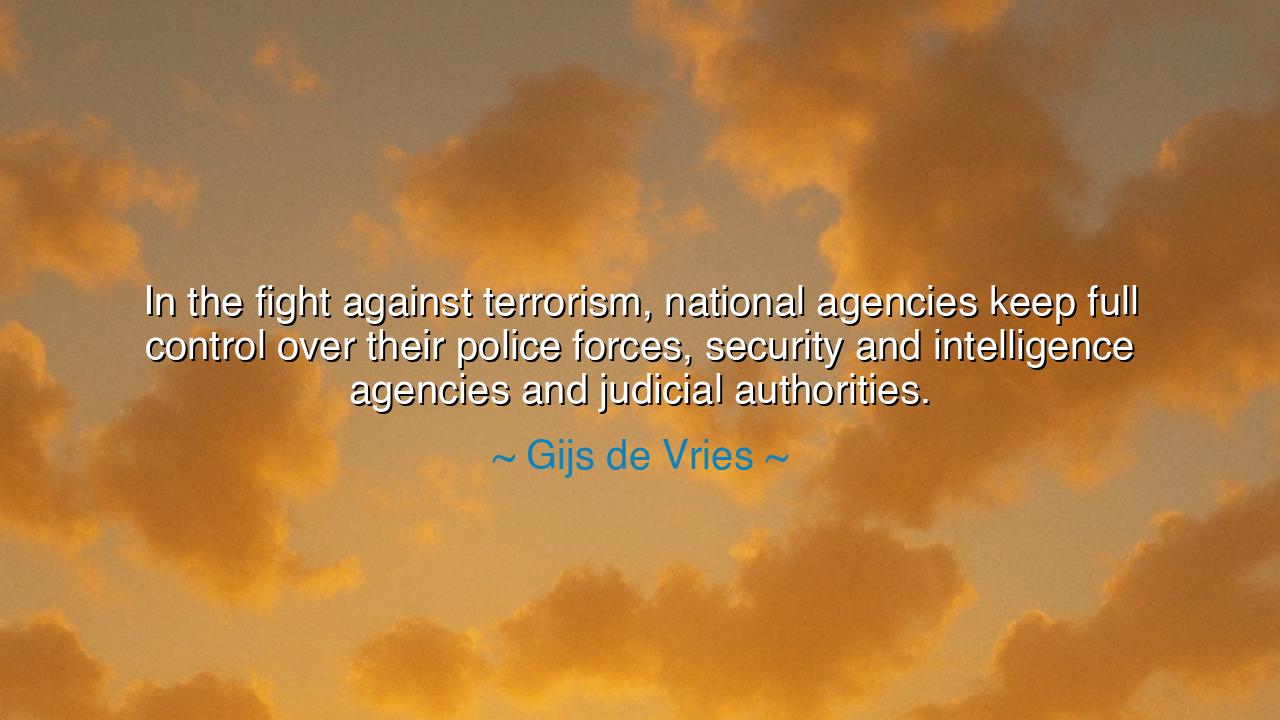
In the fight against terrorism, national agencies keep full
In the fight against terrorism, national agencies keep full control over their police forces, security and intelligence agencies and judicial authorities.






“In the fight against terrorism, national agencies keep full control over their police forces, security and intelligence agencies and judicial authorities.” — Gijs de Vries
Hear these words, O students of power and guardians of peace, for within them lies the sober wisdom of Gijs de Vries, a man who stood at the crossroads of nations, charged with defending Europe against the shadows of terror. His words are not the rhetoric of conquest, but the counsel of balance—between unity and sovereignty, between cooperation and control. In them, he reminds us that in the eternal fight against terrorism, every nation must remain the master of its own forces, for the safety of the people depends upon order, not chaos; upon disciplined guardianship, not scattered command.
To understand the depth of this saying, one must remember the time from which it was born. In the years following the dark days of September 11, 2001, the world trembled beneath the fear of invisible enemies. Across borders and oceans, governments rose to defend their people against an enemy that wore no uniform and pledged allegiance to no flag. In Europe, alliances were formed, treaties signed, and intelligence shared—but always with this understanding: that no nation, however friendly, should surrender its sovereignty. Each would guard its people with its own hands, its own eyes, its own laws. Thus spoke de Vries, as Europe’s first Counter-Terrorism Coordinator, forging unity without erasing independence.
For this is the paradox of freedom’s defense: to protect the world, one must not lose the nation; to strengthen the alliance, one must not weaken the authority of the state. History has shown us what happens when power becomes too centralized, when fear is used to dissolve boundaries. Recall the empires that swallowed smaller kingdoms in the name of security—Rome, mighty though it was, fell not by invasion alone, but by the decay of its inner strength. The guardians became complacent, and the governed forgot their duty. So too, de Vries warns us: when the guardians of justice surrender their independence, they risk losing both freedom and vigilance.
Yet this teaching is not only for kings and ministers; it is for every man and woman who must confront the darkness in their own time. The battle against terrorism is not merely a struggle of arms, but of values—of keeping our institutions intact even under the weight of fear. A people who trade liberty for safety, who hand their power blindly to distant authorities, will find that they have lost both. The intelligence agencies, the police, the courts—these are the pillars that stand between civilization and chaos. They must remain bound by law, guided by wisdom, and answerable to their own people.
Think, for example, of the nation of Britain during the Second World War. When the Luftwaffe bombed London, and the fires of war darkened the sky, Britain stood not by dissolving its sovereignty, but by strengthening it. Its police, its security services, its courts—all functioned under national command, united yet distinct. Allies surrounded her, yes, but the heart of the defense was her own. Churchill did not say, “Let others save us.” He said, “We shall never surrender.” This spirit of self-reliance within cooperation is the essence of what de Vries means: that even in alliance, the soul of a nation must remain its own.
But there is also compassion hidden in his words. For control does not mean isolation. It means responsibility. To control one’s forces is to be accountable for them—to ensure they serve justice, not tyranny; protection, not persecution. When nations coordinate in the war against terror, they must remember that power shared must still be power governed. Otherwise, the shield becomes a sword, and the line between defense and oppression vanishes. Thus, vigilance must be paired with virtue, and strength with restraint.
So take this lesson, O guardians of the present age: in every battle—be it against terror, against ignorance, or against corruption—remember that the truest strength lies in discipline and ownership. To control one’s power is to honor one’s duty. Whether you govern a nation or your own heart, do not surrender your agency to fear or dependence. Stand firm in unity, but stand firm also in self-command. For a nation—or a soul—that knows itself, that commands its own will, and that defends its own justice, can never be conquered from without. It is only when it forgets this sacred truth that it begins to fall.






AAdministratorAdministrator
Welcome, honored guests. Please leave a comment, we will respond soon